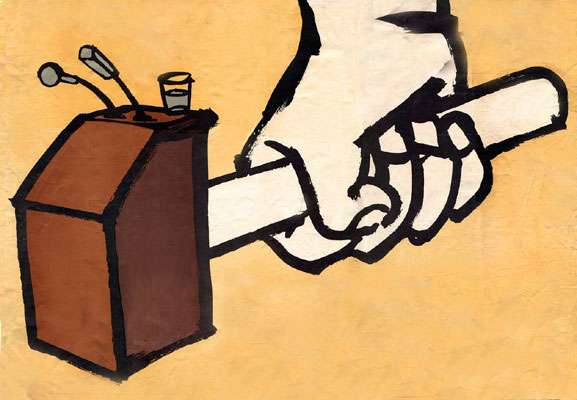We have a habit of turning to the state, “the higher-ups”, for recognizing our view or our doctrine “the only truth”
Recently, it became known that a national security concept would be elaborated in Armenia. Are there phenomena in our country that intimidate our spiritual security? Of course, there are, and they are serious. What is the state to do here? In my opinion, nothing. It is up to the clergymen of the Armenian Apostolic Church, and us, the believers. When we turn to the state asking to ban this or that series or sect, it speaks about our impotence.
If our clergymen in their manner of life had not earned enough authority for the citizens to listen to them, the government has nothing to do here. The State shall only ensure the implementation of the Constitution and other norms of the laws, including the separation of the state from religion and freedom of conscience. Such provisions, it seems to me, are clearly spelled out in the first amendment of the U.S. Constitution: Congress is prohibited from passing laws that support any religion or approve any state religion.
Otherwise, the resolution adopted in Germany in the 16th century will operate, “Whose realm, his religion”, «cuius regio, eius religio». This principle was established in 1555, after reaching the so-called religion of Peace of Augsburg. The solution was as follows: in Germany, the “lands” where the prince is Protestant, the state religion is Protestantism, where the “boss” was a Catholic, so as the religion. If, suddenly, you are ministering a “wrong” religion on your territory, you can move to the “country” where your “suitable” religion is a state status.
Read also
This was done for the Catholics and Protestants not to “eat” each other, however, the solution was evidently not enough, because, in modern language, it was “stimulating the migration.” People want to live in their homes, on their lands and practice the religion they want or to be an atheist. For this very reason, the European philosophical thought rejected “the role of being a state regulator.”
The fight against proselytizing, definitely, is an integral part of spiritual security. Again, I am confident that the state has nothing to do with this fight; our spirit should be so tight that no “hunter” could be able to make harassments against it. It is impossible to intensify the spirit with administrative methods. On the other hand, professing or non-professing any religion, voluntarily changing of religion is a fundamental human right.
The UN respective document, Article 18 reads: “Everyone has the right to freedom of thought, conscience and religion; this right includes freedom to change his religion or belief, and freedom, either alone or in community with others and in public or private, to manifest his religion or belief in teaching, practice, worship and observance.”
It is quite another matter when a person accepts a religion or changes it forcedly. In other words, if you are, roughly speaking, putting the gun to the person’s temple and make him to become an atheist, a member of the Armenian Apostolic Church or any other religious community, you are committing a crime. Perhaps it’s worth that our National Assembly adopts a law about it. But, here, the definition of what is meant by “forcedly” should be clearly spelled out.
Apparently, realizing the delicacy of the issue, both the Ministry of Justice and the Parliament do not rush to adopt such a law. We abandon the terms of “improper proselytism” and “proselytizing”, because it would give rise to different translation problems, but if we do not find a suitable synonym, we would keep this term, which is based on the precedent right of Human Rights European Court,” notes Deputy Minister of Justice, Grigor Muradyan. According to him, “criminal responsibility is necessary in all cases where there are elements of violence or threat. The remaining actions which may be qualified as “improper proselytism” may be subject only to administrative responsibility” (quoted from crossnews.am).
The first assertion (about “violence” and “threat”) is indisputable. “The remaining actions” are not very clear. Is it an action of administrative responsibility when a sectarian is wandering in the streets with his books and trying to talk with people? The majority of the population in Armenia and, of course, our clergymen think, yes, in my opinion, no. Let’s educate our citizens that they never, under any circumstances, be affected by such preaching. Anyway, it is impossible to assign a police officer for every preacher.
Spiritual security, of course, has a much broader concept than the fight against “improper proselytism”. This small example is to show that our society, the Armenian Apostolic Church, and the intellectuals should really worry about such problems. But, no one should turn to the state so that the later with its “administrative” leverages shall promote recognizing their view or doctrine as the “only truth”. First, it is a display of “unfair competition”: you can not “sell” your “product”, and urge the state to ban “the other’s”. However, most importantly it is absolutely useless. If any spiritual value, no matter how good it is, is wrapped around your neck by the state, it immediately becomes devalued. Moreover, it is devalued to the extent that regardless of how long you persuade and explain, no one will believe it for many decades.
ARAM ABRAHAMYAN
The series of articles is prepared by the Open Society Foundations-Armenia support. The views and analyses found in this series of articles reflect the opinion of the participants and are not approved by the Open Society Foundations-Armenia or its Board. The preparation of the series of articles is made possible thanks to the comprehensive financial support of the Open Society Foundations-Armenia, within the media support program grant No 18624.






















































